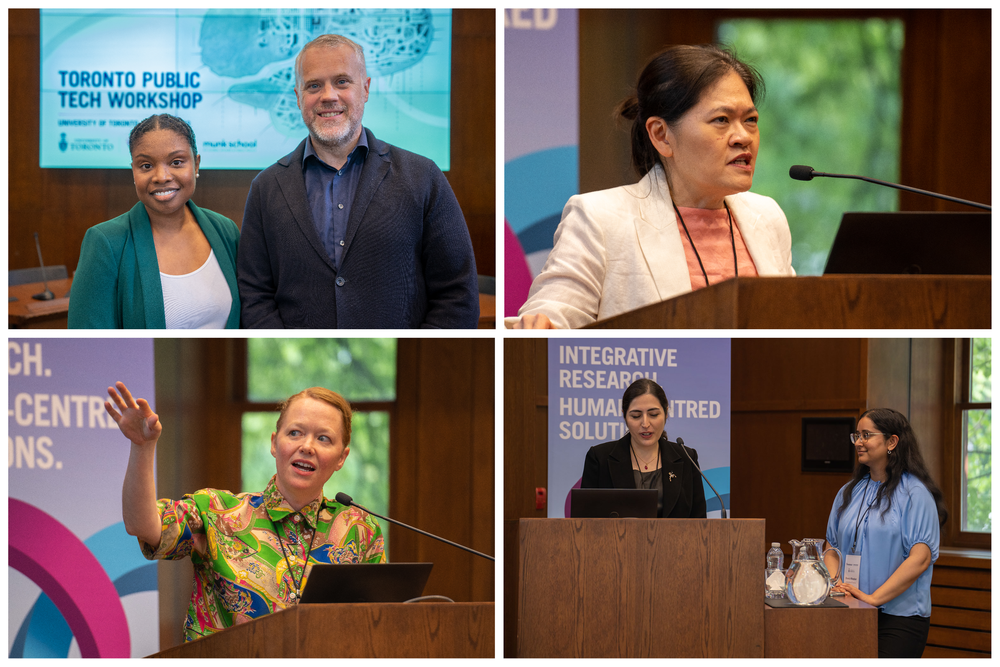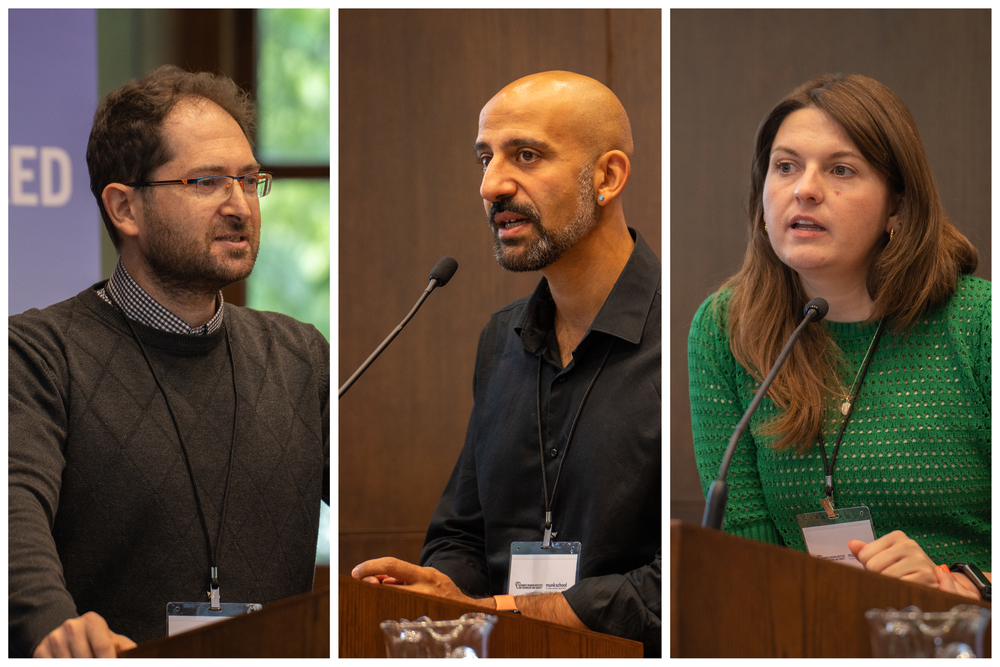What are the implications of technology for the public domain?
Whether it’s governments using big data to develop policies aligned with citizen needs and expectations, or digital platforms facilitating and influencing public discourse, the interaction of technology with public spheres, processes, and institutions can mean increased connectivity, participation, and access to information.
But these dynamics also raise crucial questions about privacy, security, and the digital divide. Technology for public purposes requires careful management to ensure its equitable and responsible use.
The inaugural Toronto Public Tech Workshop, co-hosted by the Schwartz Reisman Institute for Technology and Society (SRI) and the Munk School of Global Affairs & Public Policy at the University of Toronto, sought to address some of these and related questions.
Convened and hosted by Peter Loewen, director of the Munk School and associate director at SRI, the workshop invited seven researchers from diverse areas of inquiry — from human rights to history, from computer science and engineering to health informatics — to present papers on the use of technology for public purposes. Wide-ranging discussions followed each presentation, with researchers from all areas of inquiry meeting on common questions and sharing insights.

“This workshop was almost like an exploratory mapping exercise,” says LK Bertram, associate professor in the Department of History in the Faculty of Arts & Science and a presenter at the workshop. “It helped me to think about how we can come together and support each other as we work in our own fields.”
The workshop kicked off with a presentation from Lynette Ong, a professor in the Faculty of Arts & Science's Department of Political Science and the Munk School’s Asian Institute. A specialist on the Chinese state, Ong described her developing research into China’s outsourcing of digital surveillance and citizen repression initiatives to third-party for-profit tech enterprises.
“China doesn’t use technology for public purposes as much as for public opinion control,” said Ong, pointing out that technology enables a particular kind of preventative repression. By monitoring digital communications and isolating potentially problematic anti-state discourse, the Chinese state “preempts people’s collective action before the fire of grievances actually breaks out,” said Ong.
Onur Bakiner, associate professor in the Political Science Department at Seattle University, presented his research into the European Union’s nascent artificial intelligence (AI) regulation efforts and what insights we can draw about how lawmakers and other stakeholders understand and imagine AI and its particular challenges.
“The kind of meaning that people — and policymakers — imagine for science and technology has real-world consequences,” said Bakiner. “Institutions then do the work of translating imaginaries into something more concrete such as policy.”
Bakiner’s own academically diverse career — first as a human rights researcher who then studied computer science — was well aligned with the workshop’s goals of fostering interdisciplinary collaboration.
“The incorporation of the humanities into digital spaces — especially thinking about data science and AI from a humanities perspective — will, I think, do a lot to mitigate some of the problems we are talking about at this workshop,” said Bakiner.
Notably, the workshop featured two presentations on the role of technology in postsecondary education, addressing student experiences as they relate to data collection, prediction, information security, and digital privacy.
Kelly McConvey, a PhD student in U of T’s Faculty of Information and a 2023 Schwartz Reisman graduate fellow, presented work on the use of algorithms for decision-making in higher education. In a literature review on the topic, McConvey and her collaborators found a lack of human-centred data science approaches, resulting in potentially negative or exclusionary outcomes for student populations subject to decisions like admissions or assessments that are made with the help of — or exclusively by — AI.
In a related presentation, Yan Shvartzshnaider, assistant professor in the Department of Electrical Engineering and Computer Science at the Lassonde School of Engineering at York University, shared his work on third-party plug-ins for learning management systems (LMSs).
An LMS like Moodle is often used by educators alongside a third-party plug-in like the popular plagiarism checker TurnItIn. But Shvartzshnaider’s work shows a lack of oversight by post-secondary institutions when it comes to the ways in which these third-party plug-ins take, use, and store the data entered in and generated by LMSs.
His research uncovered a “fragmented and dysfunctional” governance landscape, outdated regulation and review processes, a lack of clarity about who retains oversight, and a lack of expertise at universities that forces some institutions to outsource the risk assessment of new digital tools to external agencies.
“I really appreciated this event’s format,” said McConvey of the workshop. “It felt like a far more collaborative conversation about our work. That’s so valuable and so rare when you’re talking about things from so many different academic disciplines.”

“This workshop was a really vibrant and dynamic space to hone in on the big questions that affect us,” said Bertram. “When you speak to people from other disciplines about these questions, you find linkages that you didn't realize existed — and other linkages that you very much anticipated. AI needs the humanities, and we need to have more days like this.”
Bertram’s own presentation on “making good data go viral” focused on why understanding social media algorithms matters (in particular, Instagram and TikTok) when developing effective strategies to deal with disinformation. Training scholars in basic “algorithmic literacy,” Bertram argues, is essential to displacing disinformation and giving larger publics the good quality data they crave.
“There aren’t a lot of scholars and scientists on these platforms,” said Bertram, “but these platforms have massive and growing audiences that are only going to get bigger. They’re very powerful global political forums.”
As the anonymous curator of a large-scale public history campaign that hit 17.5 million views, Bertram is spearheading a new SSHRC-funded project that focuses on high-yield data packaging strategies for larger-scale publics using video-based algorithms.
Bertram encouraged academics to deploy their existing academic work to the public. “The public is really hungry for quality data,” she said. “Nobody wants to consume disinformation. The public is curious, hungry, and frustrated that scholars are absent from these platforms.”
The workshop ended with a presentation by Somayeh Amini and Shveta Bhasker, Master of Health Informatics (MHI) students at the Institute of Health Policy, Management and Evaluation at the Dalla Lana School of Public Health.
Their project explored the potential for taking so-called “unstructured” data that reflects the social and behavioural determinants of health (things like socioeconomic status and education level) and translating them into inputs that could be analyzed by algorithms to better predict health outcomes. With the proliferation of electronic health records (EHRs), such data processing could vastly improve patient outcomes in the healthcare field.
“We had lots of people from different perspectives working together on this project,” says Bhasker of their research.
“For example, my co-lead Somayeh is a pharmacist by background. We had nursing students, psychology students, computer science and data science specialists all working on this project. And I have a background in English and philosophy before I enrolled in the health informatics program. Bringing all of our perspectives together is what has really made this project possible. And this is something that I hope to carry forward — to learn from different fields and different perspectives, and then ask how I can apply it to my work.”
The Toronto Public Tech Workshop aims to be an annual recurring event that gathers scholars and practitioners from all areas of research to discuss the ways in which advanced technologies can best serve the public interest.

